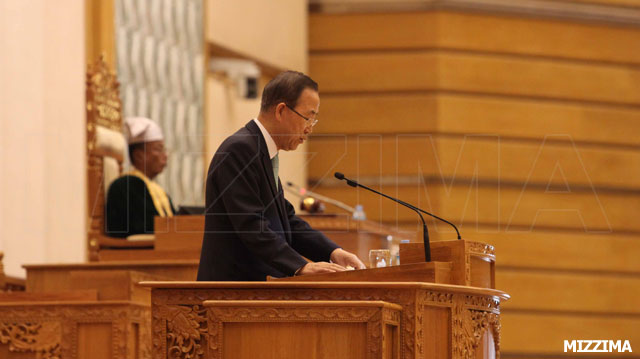U.N. Secretary-General Ban Ki-moon on Monday called for foreign governments to “go even further” in removing all trade restrictions and sanctions against Burma, in an address to the Burmese Parliament in Naypyitaw.
 Ban is the highest foreign official to address the Parliament since it was created about one year ago, signaling a new page in relations with foreign governments.
Ban is the highest foreign official to address the Parliament since it was created about one year ago, signaling a new page in relations with foreign governments.
After his speech, Ban praised Aung San Suu Kyi for ending the dispute over National League for Democracy (NLD) members taking the oath of office as Burmese members of Parliament.
Suu Kyi’s announced on Monday that the NLD would drop its dispute for the time being, and its members would take the oath on Wednesday as members of Parliament.
Ban said the resolution was “in the interest of greater and fuller democracy.”
In his speech, Ban praised Burmese President Thein Sein for “his vision, leadership and courage to put Myanmar on the path to change.”
“I am here to say, and to say clearly: the road before you is exciting,” Ban told lawmakers. “But it will not always be easy. Eventual success will rest largely on this assembly.
“I have no doubt that Myanmar will quickly regain its place as a respected and responsible member of the international community,” Ban told lawmakers. He said the road forward would not be easy or quick, and “the perils and pitfalls are many.”
“There is no single formula for success,” he said.
He cited political leadership as an essential need in forging a prosperous future, and he saluted Thein Sein and Aung San Suu Kyi and others for their role in the recent elections.
Elections and open government are keys to democracy, he said, but “they must be matched by a healthy and vibrant political climate.”
“President Thein Sein and Daw Aung Suu Kyi have demonstrated the confidence and statesmanship needed to look beyond politics to the larger interests of the nation,” he said. The “generational shift now taking place” requires understanding and cooperation. He said the people of Burma expect “genuine participatory democracy” to take place in Parliament and within all levels of the country, and for lawmakers to “accelerate the pace of change.”
Two important milestones ahead were Burma’s Asean chairmanship in 2014 and the 2015 national elections, he said.
For progress to be achieved, the Burmese people must see positive changes in areas such as health care, education, jobs creation, supporting manufacturing and service industries, and development of key infrastructure.
Finally, he said national reconciliation must be fully achieved, requiring resettlement of displaced people, security guarantees for ethnic and political groups and the release of political prisoners. He noted the situation in Kachin State and called for peace and development there, and access for humanitarian aid groups.
There must be safeguards for civil society and the rule of law, and respect for human rights, especially for free association and free speech.
He reminded lawmakers that Burma was a founding member of the U.N., and that he followed in the footsteps of U Thant, the former U.N. secretary-general who called on the world to overcome violence and stressed the need “to understand each other and to develop a spirit of One World.”
Ban will wrap up his three-day trip on Tuesday in a meeting Suu Kyi at her home in Rangoon
On Monday, Ban also signed an agreement for the U.N. to help Burma conduct a census in 2014, the country’s first in 31 years.
Population estimates vary widely, with the World Bank putting the figure at 48 million, the Asian Development Bank at 60 million and the IMF at 64 million.
Ban will travel to Shan State, an isolated area where a large amount of the world’s opium is grown. Burma is the second-biggest producer of opium after Afghanistan and has a rising number of drug users that has led to the third-largest HIV epidemic in Asia, according to the U.N. program on HIV/AIDS.
The U.N. Office on Drugs and Crime said last month in a statement that government efforts to eradicate opium in the region have made significant progress, in part due to negotiations on peace deals with minority ethnic groups.
“These cease-fires present the opportunity for a new beginning, but what is really needed for the people of Shan is a permanent end to all conflict through the acquisition of a lasting peace,” Jason Eligh, Burma’s country manager for the U.N. drug office, said.


